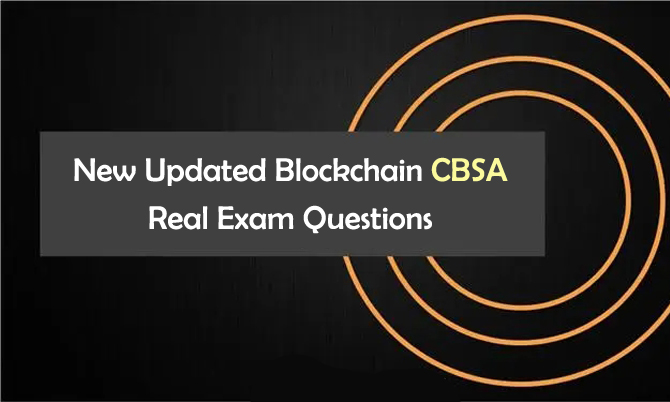BTA Certified Blockchain Solution Architect CBSA real exam questions have been updated, which are the best preparation material for you to study the test. The Certified Blockchain Solution Architect CBSA exam is an elite way to demonstrate your knowledge and skills in this emerging space. The audience of CBSA exam are Consultants, Programmers & Developers, University Professors, Software Engineers, CEO/CTO/CIO and Government Officials.

Certified Blockchain Solution Architect CBSA Exam
Blockchain certification CBSA exam information is the first step for you to learn the test.
Number of Questions: 70
Pass Score: 70%
Time Allotted: 90 minutes
Exam Language: English
Exam Format: Online
Blockchain Certification CBSA Exam Skills
To pass Blockchain certification CBSA exam, you will have a good understanding of the following skills.
The difference between proof of work, proof of stake, and other proof systems and why they exist
Why cryptocurrency is needed on certain types of blockchains
The difference between public, private, and permissioned blockchains
How blocks are written to the blockchain
Where cryptography fits into blockchain and the most commonly used systems
Common use cases for public blockchains
Common use cases for private & permissioned blockchains
What is needed to launch your own blockchain
Common problems & considerations in working with public blockchains
Awareness of the tech behind common blockchains
When is mining needed and when it is not
Byzantine Fault Tolerance
Consensus among blockchains
What is hashing
How addresses, public keys, and private keys work
What is a smart contract
Security in blockchain
Brief history of blockchain
The programming languages of the most common blockchains
Common testing and deployment practices for blockchains and blockchain-based apps
Share Updated Blockchain CBSA Real Exam Questions
All the updated Blockchain CBSA real exam questions are the best material to study the above BTA Certified Blockchain Solution Architect skills. Share some updated Blockchain CBSA real exam questions and answers below.
1.Which of the following is NOT a requirement of an enterprise blockchain typically?
A. Ensuring appropriate visibility; transactions are secure, authenticated & verifiable
B. Cost efficient blockchain
C. Append-only distributed system of record shared across business network
D. Transactions are endorsed by relevant participants
Answer: B
2.You are considering writing smart contracts and there are a few different languages you can consider. (Select two.)
A. Truffle
B. Embark
C. Solidity
D. Serpent
Answer: CD
3.Gas has multiple associated terms with it: Gas Prices, Gas Cost, Gas Limit, and Gas Fees. The principle behind Gas is to have a stable value for how much a transaction or computation costs on the Ethereum network.<br />Which is considered to be the static value for how much a computation costs in terms of Gas?
A. Limit
B. Price
C. Fee
D. Cost
Answer: D
4.___________is advantageous because it presents scalability and low cost transactions, but like DPoS introduces a component of centralization.<br />What algorithm is being referenced here?
A. DAG
B. Hashgraph
C. Byzantine Fault Tolerance
D. Proof of Stake
E. Proof of Work
Answer: C
5.Select the best statement for determining how consensus is reached.
A. By every single node in the blockchain network executing the same transaction.
B. By a cryptographic secure signature algorithm called ECDSA which makes sure that cheating is impossible.
C. By the miner nodes which make sure that a transaction is valid.
D. By every single node in the blockchain network different transactions.
Answer: A
